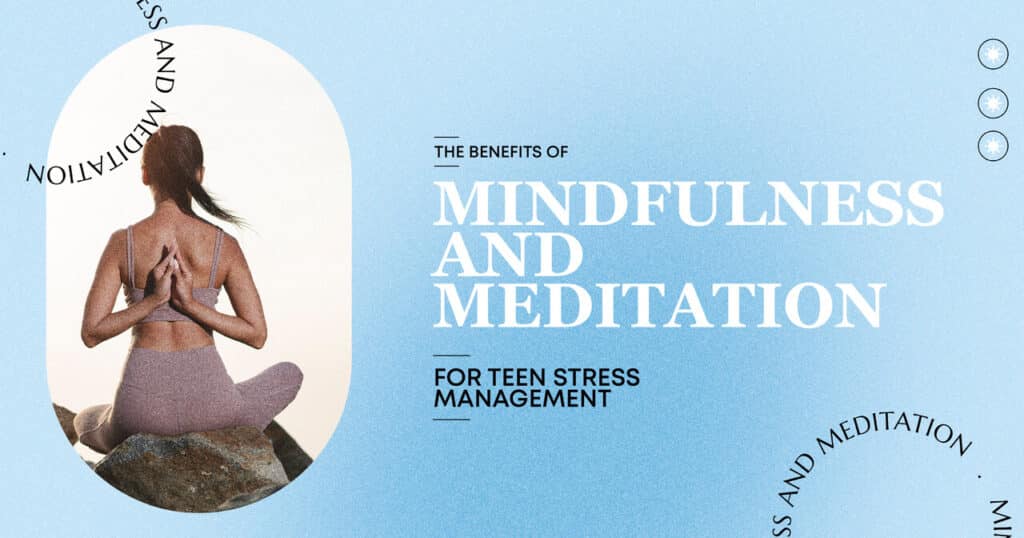Hey there! If you’re a teen reading this or a parent concerned about a teenager, you know that stress isn’t just a grown-up issue—it’s something many teens deal with daily. So, what’s going on in a teenager’s life that could cause so much stress? Let’s break it down.
Essential Takeaways
- Mindfulness and Meditation Offer Powerful Stress Management Tools: Incorporating these practices into daily routines can help teens manage stress, improve emotional health, and enhance academic performance.
- Start Small and Be Consistent: Even short, daily mindfulness and meditation sessions can yield significant benefits. Consistency is more important than duration.
- Find the Right Practice for You: There are many meditation practices available. Experiment with different mindfulness techniques to find the best fit for you or your teen.
Common Sources of Teen Stress
Academic Pressures
School can be intense. With exams, assignments, and the constant push to excel, it’s no wonder many teens feel overwhelmed. The pressure to get good grades, excel in extracurricular activities, and gain admission to a good college can lead to heightened anxiety and even impact academic performance.
Social Expectations
The social scene can be tricky. Navigating friendships, dealing with peer pressure, and managing social media can be challenging. Teens often feel the need to fit in, which can be stressful and create negative emotions that further impact their mental health.
Family Dynamics
Family issues, such as conflicts with siblings, parental expectations, or changes like divorce, can weigh heavily on a teen’s mind. The stress from these situations can amplify symptoms of anxiety and affect overall emotional balance.
Personal Issues
Teens are also figuring out their identities, interests, and future goals. This self-discovery process, combined with hormonal changes, can contribute to feelings of confusion and stress. Mindfulness for teens can serve as a practical tool for navigating these complexities.
Why It’s Important to Address Teen Stress
Addressing teen stress isn’t just about making life easier now; it’s about setting the stage for a healthier future. Unmanaged stress can lead to mental health issues such as anxiety and depression. By effectively managing stress, teens can enjoy better mental well-being, improved academic performance, and healthier relationships.
What is Mindfulness and Meditation?
Defining Mindfulness
Mindfulness is about being fully present, noticing your surroundings, thoughts, and feelings without judgment. It’s about paying attention to the present and becoming more aware of your internal and external experiences. Key mindfulness activities include:
- Breathing exercises: Techniques like deep breathing can promote relaxation and reduce stress.
- Mindful breathing: Focusing on your breath helps bring your mind back to the present moment.
- Body awareness: Recognizing bodily sensations allows teens to tune into their physical feelings and stress levels.
Key principles of mindfulness include:
- Awareness: Being conscious of your thoughts, emotions, and environment.
- Non-Judgment: Observing your experiences without labeling them as good or bad.
- Acceptance: Allowing yourself to experience your thoughts and feelings without trying to change them.
Next time you’re eating a meal, try to focus solely on the taste, texture, and aroma of the food. This simple act of mindfulness can help you stay grounded and reduce stress.
Introducing Meditation
Meditation is a practice that helps train the mind to focus and relax. It involves various techniques designed to improve mental clarity and emotional calm. Here are a few types of meditation:
- Guided meditation: Following a guide who leads you through relaxation techniques. Many apps offer guided sessions tailored for teens.
- Focused meditation: Concentrating on a single point of focus, like your breath or a candle flame.
- Transcendental meditation: A technique involving the repetition of a mantra to reach a state of restful awareness.
Meditation can be like a mental workout, helping build resilience and manage stress better. It’s not about making your mind blank but about learning to direct your focus and calm your thoughts.
The Benefits of Mindfulness and Meditation for Teens
Stress Reduction and Emotional Regulation
How Mindfulness Helps with Stress Mindfulness is a powerful tool for managing stress. By practicing mindfulness, teens can become more aware of their stressors and learn to respond to them more effectively:
- Increased Awareness: Identifying stress triggers helps teens address them more effectively.
- Improved Reaction: Mindfulness fosters measured responses rather than impulsive reactions.
- Reduced Anxiety: Regular mindfulness practice lowers anxiety levels by promoting relaxation.
For example, if a teen feels anxious about an upcoming exam, techniques like deep breathing exercises or body scans can help them stay calm and focused.
Meditation Techniques for Stress Relief Various meditation techniques can help manage stress:
- Guided imagery: Imagine a peaceful place and focus on the details, shifting your focus away from stress and promoting relaxation.
- Progressive relaxation: Tense and then relax each muscle group to relieve physical tension and promote calm.
- Mantra meditation: Repeat a calming word or phrase to help center your mind.
These techniques can be practiced daily or as needed, quickly managing stress and improving emotional well-being.
Improved Concentration and Academic Performance
Enhancing Focus Through Mindfulness Mindfulness can significantly boost concentration and academic performance:
- Better Focus: Mindfulness helps teens stay present, reducing distractions and improving task concentration.
- Increased Productivity: Enhanced focus leads to greater efficiency in completing assignments.
- Improved Memory: Mindfulness aids memory retention and recall, beneficial for studying and exams.
To incorporate mindfulness into study routines, teens can practice short mindfulness exercises before starting homework or exams to clear their minds and improve focus.
Meditation for Better Academic Performance Meditation enhances cognitive functions, leading to better academic performance:
- Enhanced Cognitive Function: Improves attention, memory, and problem-solving skills.
- Reduced Test Anxiety: Regular meditation helps manage test anxiety, leading to better performance.
- Improved Study Habits: Promotes a calm, focused mindset, making study sessions more effective.
Teens can use meditation techniques like focused attention or guided imagery to prepare for exams, creating a more relaxed and productive study environment.
Better Emotional Health and Resilience
Building Emotional Awareness Mindfulness and meditation help teens develop better emotional awareness:
- Recognizing Emotions: Identifying and understanding emotions leads to better emotional regulation.
- Processing Feelings: Observing emotions without judgment allows for healthier processing.
- Improved Communication: Greater emotional awareness enhances communication skills, fostering healthier relationships.
For instance, if a teen feels overwhelmed, mindfulness can help them identify and understand their emotions, leading to more effective coping strategies.
Developing Resilience and Coping Skills Regular mindfulness and meditation practice builds resilience and improves coping skills:
- Resilience Building: Mindfulness helps teens adapt to challenges, making them more resilient.
- Coping Strategies: Meditation provides tools for managing stress and emotions.
- Enhanced Self-Esteem: Building resilience and coping skills boosts self-esteem and confidence.
By practicing mindfulness and meditation regularly, teens can develop the skills to handle life’s challenges more effectively.
Practical Tips for Incorporating Mindfulness and Meditation into Daily Life
Simple Mindfulness Exercises for Teens
Incorporating mindfulness into daily life doesn’t have to be complicated. Here are some simple exercises:
- Mindful Eating: Focus on the taste, texture, and aroma of your food, helping you enjoy meals and stay present.
- Mindful Walking: Concentrate on the sensation of each step, noticing how your feet feel and the rhythm of your movement.
- Mindful Journaling: Write about your thoughts and feelings without judgment to process emotions and reflect on experiences.
These exercises can easily be integrated into daily routines, making mindfulness a natural part of life.
Starting a Meditation Practice
Getting started with meditation is easier than you think. Here’s a step-by-step guide:
- Choose a Quiet Space: Find a comfortable, quiet place where you won’t be disturbed.
- Set a Timer: Start with 5-10 minutes to keep it manageable. Gradually increase the time as you become more comfortable.
- Focus on Your Breath: Close your eyes and concentrate on your breath, noticing the sensations of each inhale and exhale.
- Use a Guided Meditation: Consider using a meditation app with guided sessions tailored for teens if you’re unsure where to start.
- Be Kind to Yourself: It’s okay to have thoughts while meditating. Acknowledge them and gently bring your focus back to your breath.
With practice, meditation can become a valuable tool for managing stress and improving emotional health.
Conclusion
Incorporating mindfulness and meditation into daily life can significantly impact teens’ stress management and overall well-being. By understanding the sources of stress and embracing mindfulness techniques, teens can cultivate a sense of calm and resilience. It’s never too late to start, so why not give it a try? Remember, the journey to mindfulness is personal and unique, so find what works best for you and stick with it!
FAQs
- How long should teens practice mindfulness or meditation each day? Start with 5-10 minutes daily and gradually increase the duration as they become more comfortable with the practice. Consistency is key, so it’s better to practice for a shorter time regularly than to have longer, less frequent sessions.
- Can mindfulness and meditation help with sleep issues? Yes, mindfulness and meditation can promote relaxation and reduce stress, improving sleep quality. Techniques like body scans and mindful breathing are particularly effective for calming the mind before bedtime.
- Are there specific apps or resources for teens to use? Absolutely! Apps like Headspace, Calm, and Insight Timer offer guided meditations and mindfulness exercises specifically designed for teens.
- What if a teen finds it hard to focus during meditation? It’s normal for the mind to wander. Encourage them to acknowledge those thoughts and gently bring their focus back to their breath or chosen point of concentration. With practice, it will become easier.
- How can parents support their teens in practicing mindfulness and meditation? Parents can join their teens in mindfulness and meditation practices, encouraging a shared experience. Additionally, creating a calm environment and allowing time for these activities can support their teen’s journey.




